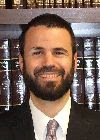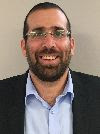
The Big Picture
 Rav Mordechai Torczyner, Currently Joint Rosh Kollel of YU and Torah MiTzion Beit Midrash Zichron Dov in Toronto
Rav Mordechai Torczyner, Currently Joint Rosh Kollel of YU and Torah MiTzion Beit Midrash Zichron Dov in Toronto
In the middle of the 19th century, south-central Poland suffered from a wheat shortage. A group of Radomsker chassidim invested heavily in grain, even borrowing money against their homes for the opportunity. But after they were fully invested, large shipments of grain arrived. The price sank; they were impoverished.
The group approached Rabbi Shlomo haKohen, Rebbe of Radomsk, and pleaded, “Have mercy on us! Daven to Hashem for the price of wheat to recover, or we’ll lose everything!”
The Rebbe of Radomsk replied, “I’m sorry, but we don’t daven for Hashem to raise the price of food. We don’t ask Hashem to stop sending His kindness!”
To which the chassidim complained, “But we’ll have nothing, what will happen to us?”
And the Rebbe responded, “Don’t worry. The One who took care of the poor when grain was expensive, will take care of you now when grain is cheap.” (Otzar Chaim, Parshat Behar)
The message of the Rebbe of Radomsk is clear: Look at the big picture; evaluate good and bad by the experience of the community as a whole.
The complaint of these chassidim appears in our parshah, as part of the challenge of observing the laws of Shemitah. The Torah instructs us: Refrain from planting in the seventh year, and abandon the wild produce for the needy rather than fence it in and harvest it. The Torah then plays mindreader, entering the mind of the landowner and giving voice to two questions: “But what will I eat in the seventh year? I won’t be able to plant, I won’t be able to harvest!” (Vayikra 25:20)
“I won’t be able to plant” is an obvious challenge; if we cannot plant, what can grow? But then “I won’t be able to harvest” highlights a second challenge: not only must we risk privation, but we must also throw open our gates and invite in the hungry community, and this is hard for a farmer to absorb.
The Torah responds to the farmer as the Radomsker Rebbe responded to his chassidim: By what right do you focus on your personal state? All of the paupers are cheering! In shemitah, they have access to every field! In yovel, the families receive their ancestral land and the slave goes free! This is wonderful for them! Look not upon your own misfortune; be happy that others will receive.
This broad perspective is a necessity for a successful State. Governing a State means sharing the polity with citizens of every stripe, and no group will win every time. How can a modern Jewish State view itself as one society? How does one argue forcefully in the Knesset, demonstrate raucously in the public square, publish articles and lobby politicians – and then daven to Hashem to help people on the other side of the aisle to win not the debate, but the lottery? And to calculate a budget which will distribute our tax dollars to feed the opposition?
Perhaps the Radomsker’s words offer an answer. The Rebbe noted that the change in the price of grain came from Hashem; the loss of the wealthy chassidim, and the profit for the needy, came from Hashem. When our rivals prosper, it’s because Hashem has sent prosperity their way. Perhaps that perspective, recognizing that not only are we one nation, but that the growth of our foes comes from Hashem, will help us to rejoice, regardless of who profits. May we learn to see our nation in this Shemitah way.
comments: torczyner@gmail.com
Lag BaOmer
 Rabbi Yedidya Noiman, Rosh Kollel in Montreal (2016-2019), Currently a Rabbi at Yeshivat Tzvia in Petach Tikvah
Rabbi Yedidya Noiman, Rosh Kollel in Montreal (2016-2019), Currently a Rabbi at Yeshivat Tzvia in Petach Tikvah
Every year, Lag Ba’Omer brings to mind the character of Rabbi Shimon bar Yohai and his unique Torah. On this day, sages alongside simple people praise Rabbi Shimon, a phenomenon that is very puzzling. There is no other Tanna who is so celebrated on the day of his death, or who is frequently mentioned in songs about his greatness. It is even harder to understand this when we take a look at his character and his Torah. Rabbi Shimon’s deep Torah does not necessarily apply to everyone, and as the Gemara (Brachot 35b) said, “Many did the same as Rabbi Shimon but did not succeed.” The question is why Rabbi Shimon is so widely admired? What is relevant about his character to all of us?
The Gemara (Shabbat 33) tells of a discussion between Rabbi Yehuda and Rabbi Shimon pertaining to the Romans. Rabbi Yehuda praises them for their actions, since they established marketplaces, bridges and bathhouses. Rabbi Yossi was silent. Rabbi Shimon responded and said “Everything that they established, they established only for their own purposes.” In response to this statement, the Romans issued a death sentence to Rabbi Shimon. Rabbi Shimon then went into hiding; he began by hiding in the Bet Midrash until his fear of being discovered led him to enter a cave.
In his book ‘Ein Aya’ on Masechet Shabbat (Vol. 1), Rav Kook explains that Rabbi Shimon’s sharp opinion derives from his deep way of looking at things. Rabbi Shimon recognizes that despite the apparent good, the root of the matter is rotten. While those things the Romans introduced may seem nice and pleasant, their foundation is evil. Rabbi Shimon identified that the root of the Romans was evil and cruel, and therefore he disapproved of attributing any kindness to them. This, says Rav Kook, is in keeping with Rabbi Shimon’s character – he examines the root of the matter, and if the root is rotten, he cannot restrain himself from criticizing and speaking against it.
However, as we know, the world is not that simple. In our world, we do not always see the hidden – only what is evident on the surface. Beyond Rabbi Shimon's sheer audacity to speak about the ruling power in this way, the Romans feel threatened by his penetrating view, and therefore Rabbi Shimon had to hide to save himself.
There might be an additional dimension here; Rabbi Shimon’s probing observation also expresses his lack of acceptance of the current reality. According to Rabbi Shimon, there is no such thing as “perhaps.” Everything must be pure and perfect, and as long as this is not the case, Rabbi Shimon will not accept reality. Rabbi Shimon will not give up on anything and it is impossible for him to compromise and wait for things to unfold. As far as he is concerned, the world must achieve wholeness, until no evil or wickedness remains. In this sense, we can see that it wasn’t that Rabbi Shimon couldn’t stand the Romans – he in fact couldn’t stand the world itself.
Thus, after leaving the cave where he had hidden for 12 years, he destroyed the fields of the Jewish farmers he saw toiling the land – for how they could give up the scared study of the Torah for worldly matters?! As long as the world is incomplete, it cannot bear such a demanding or total demand for holiness and purity and therefore Rabbi Shimon was hiding not only from the Romans but from the world itself.
Perhaps that is why we all celebrate Rabbi Shimon’s memory. Every year, we rekindle the fire of truth within ourselves. We light bonfires and attempt to awaken this value, and we strive to improve ourselves more and more. Thus, at the end, we hope to reach a situation that, “a fire will always burn on the altar and will not be extinguished” (Vayikra Ch. 6).